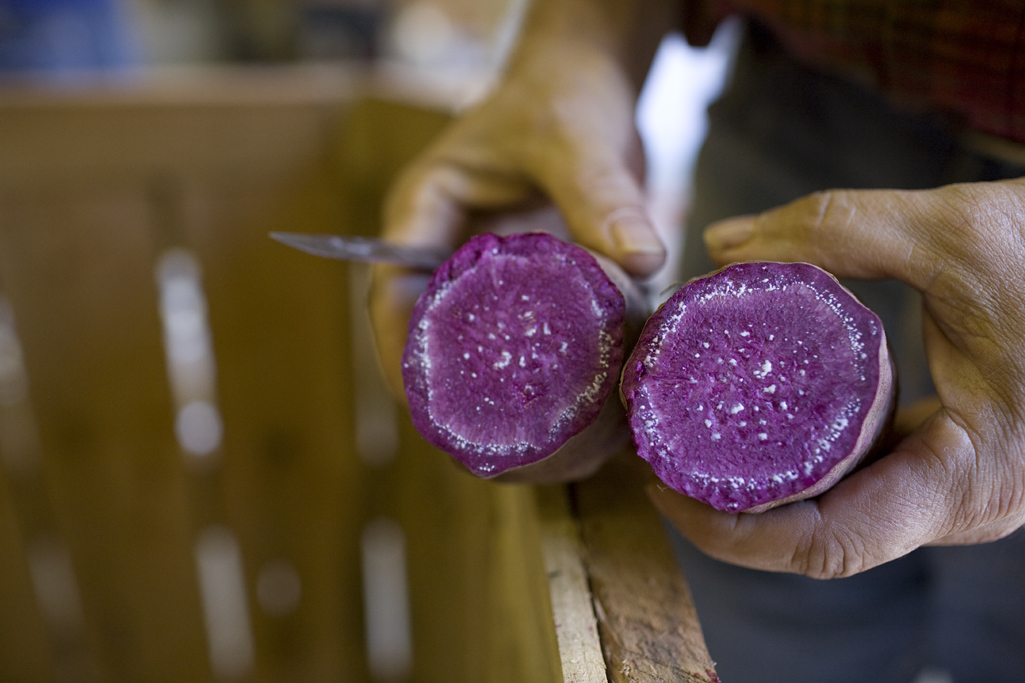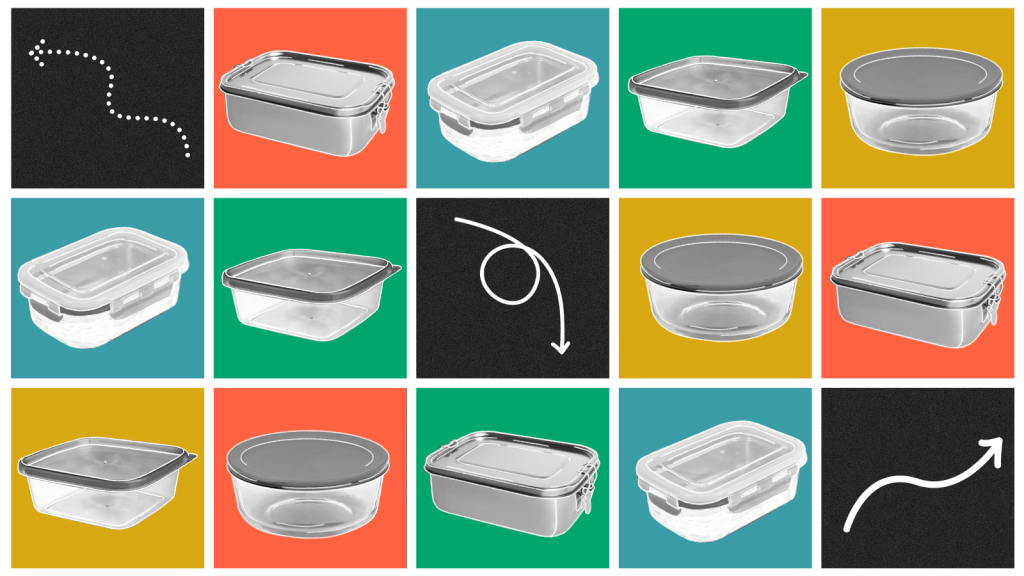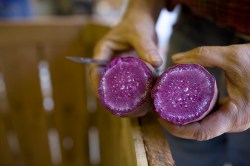
A sweet potato from Saura Pride Purple Sweet Potato, a fledgling business that was once a tobacco farm. (All photos by RAFI.)
Alan Flippin comes from a long line of North Carolina tobacco growers. But, a few years back, the crop just stopped making sense. His family’s operation stopped making much of a profit as the cost of fertilizer and other inputs rose. And, Flippin says, “I don’t really enjoy growing tobacco; I don’t use it. I was looking to get into something else.”
He wanted to transition to growing produce instead — something he could feel good about cultivating, eating, and selling. But shifting to a completely different crop is a hugely risky proposition. “With tobacco, you pretty much know how to grow it; you’ve got a market, and you get insurance for your crops,” Flippin says. “Whereas for produce, it’s very scary because there’s so much you don’t know.”
Flippin’s fledgling produce operation got off the ground with the help of a grant from something called the Tobacco Communities Reinvestment Fund. The grant enabled him to build a greenhouse and experiment with several varieties of organic vegetables to sell to wholesalers, farmers markets, and at a local co-op.
The fund was created in the wake of the Tobacco Master Settlement to help North Carolina’s agricultural communities transition to new sources of income. According to the terms of the settlement, announced in 1997, the country’s four largest tobacco companies would make perpetual payments to 46 states to compensate them for smoking-related health-care costs and, in tobacco-growing states, economic losses (four other states already had individual agreements with tobacco companies).
A percentage of North Carolina’s settlement money goes to the Tobacco Communities Reinvestment Fund, which is a program of the nonprofit Rural Advancement Foundation International (RAFI).
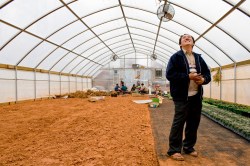
Jefferson Herr, owner of Herr Flower Farm, is a recipient of funding from the Tobacco Communities Reinvestment Fund.
“The idea,” says Joseph Schroeder, the fund’s director, was to “fund farmers to take that first step in discovering new, innovative ways of making money off farms. In turn we would make them share their lessons and business plans with their community.” Tobacco comes with many of the same issues as other commodity crops (those grown at a large scale and sold to the commodities market, such as corn, wheat, and cotton): It’s a monocrop that requires large amounts of pesticides, depletes soil, and is susceptible to disease. And tobacco locks farmers into a dependent relationship with the corporations who buy their crops and provide them with seeds and pesticides.
The transition from commodity crops to more diverse, locally focused operations can be jarring, and hard for farmers to make on their own. As Flippin noted, small and mid-scale farmers rarely have the security of crop insurance, which makes it much easier to get loans. “Getting that capital infusion [from the Fund] was a big boost to us,” Flippin says. “It really got the ball rolling.”
Beyond the struggle to access capital, Schroeder says, “the thing about commodity production — and tobacco is one of the best examples of this — is you don’t learn how to do everything you need to do to be an entrepreneur. All you learn how to do is grow the product.”
In addition to money, the grant gave Flippin access to guidance from a regional expert and support from a network of grantees around the state. And, true to the other end of the deal, Flippin’s business now serves as a model for how a farm can transition from tobacco to produce. “We’re one of the farms everybody’s looking towards to see if we actually make money or not,” he says.
Though the fund was originally intended for tobacco growers, it’s now open to anyone who earns the majority of their income through farming. In addition to grants for individual farmers, the fund awards community grants for collaborative efforts, and the range of projects they’ve have supported — over 500 in the last 15 years — is an inspiring testament to the potential of farmers’ innovation.
Meredith McKissick, who grows flowers, got a community grant to buy shared-use equipment for a farmers’ co-operative she belongs to near Asheville, N.C., and later served on the review board that selects grantees.
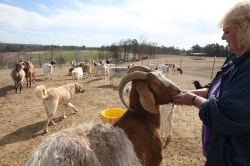
Kay Doby of Hot Shot Goat Farm (once a debt-inducing conventional poultry business).
“It was a super amazing experience for me to see all the different farmers trying to be innovative,” she says of the review process. “There was one fellow who had been [raising chickens] and had been asked to make upgrades he simply couldn’t afford, so he was forced out of his contract. His family banded together and decided they would turn one of the chicken houses into a creamery for dairy goats. Despite his age, he was starting over from scratch. That made me feel like there was hope for some of these growers getting squeezed out.”
Schroeder explains that while other states often funnel settlement funds toward a few specific crops and farming practices, in North Carolina, they “trust the farmer to be the expert.”
That strategy has paid off: Schroeder says RAFI’s surveys report that over 80 percent of the projects it’s funded are successful after three years. And because of the requirement that proposals be replicable — ideas that other farmers could learn from and adapt — the success of any one project has a resounding impact. A University of North Carolina study [PDF] found that each dollar awarded to a farmer through the reinvestment fund generates a whopping $205 of local economic activity, and that each grant creates an average of 11 new jobs in one year.
The fund is based on some pretty simple principles: Support farmers with new and creative ways to make a living off the land; encourage them to share their ideas and inspire others; and in the process, revitalize rural economies once dependent on commodity crops. It’s exciting to imagine how this model could be applied to other industries — corn, industrial livestock, even coal and oil.
Sadly, the fund has taken a bit of a financial hit. It’s fully funded by the North Carolina Tobacco Trust Fund Commission, which was nearly eliminated in the state’s recent budget crisis; instead, it went from distributing $35 million to just $2 million. That means this year, the Tobacco Communities Reinvestment Fund was only able to give out 34 grants compared to last year’s 181 grants. But the ripple effects of the fund will hopefully continue to widen, especially as recently funded projects grow.
Flippin, for his part, feels that his years of produce-growing trial and error are about to pay off. “The broccoli’s looking great, the zucchinis are looking great, and the tomatoes are looking great,” he says. “It’s finally all coming together this year.”

